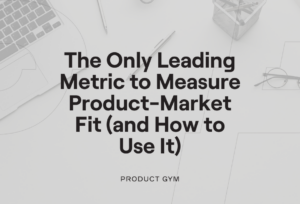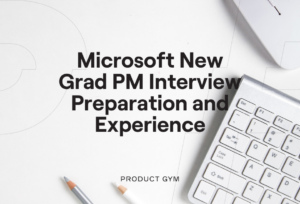You passed the first interviews, solved your case studies, and patiently navigated through all of the challenges that came along during the Product Manager job hunt. Now, it’s time to face the final round interview questions.
If you’ve made it to the final round before but didn’t get the job, then this post can help you understand what it takes to nail final round interview questions and get the Product Manager job offer. We have compiled the most common Product Manager final round interview questions along with some branding and interviewing tips.
About the Interview Process
For starters, Product Manager interviews generally consist of four rounds. The first round is a simple HR phone screen, followed by another phone or video interview with a member from the product team, followed by an onsite interview — most likely to discuss the case study, followed by a final interview with the Head of Product, VP of Product. or even the CEO (depending on the size of the company)!
While it may seem like the most important aspect of the Product Manager interview is the case study, the final onsite interview is the ultimate opportunity for you to display your capabilities and credibility to senior leadership. At the end of the day, these are the decision-makers, so you have to be at your best.
6 Final Round Interview Questions to Ask
If you have gotten this far into the process, it’s likely that you already know enough about the role and company for them to seriously consider you as a candidate for the position. In the final interview, the two most important qualities to demonstrate are a genuine interest in the role and competency in communicating knowledge. This ties very specifically to asking good questions about the business and strategy.
So, what final round interview questions should you ask? Here’s a list of genuine questions that clearly display your interest in the company’s future:
- Talk to me about your company’s ten-year plan.
- Do you think that your primary product is going to be acquired?
- Do you have an exit strategy?
- Are you looking to go public?
- Are you looking to sell the company and be a feature on Google?
- What is the long-term strategy?
Note that some of these questions might not apply to you, depending on the company you are interviewing with. If you are interviewing with Google, for instance, (please!) avoid asking questions about going public or exit strategies. Small to mid-sized companies will find these questions more relevant.
Also, notice that the questions have a general approach, meaning that they don’t focus on the specific product or team that you’ll be involved with. As we mentioned before, the main focus of this round is to have a generalistic conversation about the company’s overall strategy.
Communicating with Senior Leadership
When you talk to these individuals — whether they’re the president, founder, CEO, or just high-level company visionaries — keep in mind that they are very focused on the company vision. This means that every question you ask, or every answer you give to their questions, has to be focused on the company vision. It is a good idea to go to the company website and read its “About” page to have a good sense of the company’s vision. Take note of the specific wording and examples they use as it is highly likely that the interviewers will use similar vocabulary and tone.
Whether addressing your reason for leaving or discussing product development lifecycles, always focus on the company vision. If you want to impress and have a really good shot at winning this interview, don’t stop at listing what questions to ask. Do your research about the company and be prepared to have a more in-depth conversation. Here’s a roadmap to crafting your company/strategy research.
When in Doubt, Work with an Interview Coach
If you’re struggling to convert final round interviews into job offers, interview coaches like the ones at Product Gym can help you develop a strategic approach to improve your numbers.
Interview coaches provide a range of services to help you navigate the gruelling Product Manager interview process as an aspiring or first-time Product Manager. Some of these services are tangible and easy to unpack, like reviewing your case study presentations before you submit them and providing pieces of strategic advice when it comes to final-round interview questions and salary negotiation.
But product management interview coaches can also help you in more hard-to-describe ways. For example, an interview coach might help you recognize red flags in the interview and navigate which companies you do and don’t want to pursue based on culture fit. They can also help you build your confidence, crush imposter syndrome, and develop a growth mindset. Our goal is to help our members land a Product Manager job they love, and succeed in their day-to-day as a PM. All in all, an interview coach will help ensure you make the absolute best impression possible on your interviewer.
Company Research for the Final Interview
While there is no one-size-fits-all solution to craft your research, there are a few items that you should know about the company that you are interviewing with:
CEO and Senior Leadership
Learn who is running the company and the team behind the product, sales, technology, operations, and strategy. Google their names, check their LinkedIn profiles and understand their basic backgrounds. Look for any interviews, news articles or podcasts they published. Write down a couple of important points they made about the future direction of the company and/or the product.
Define and Understand the Product
This is an essential activity to do and by now you should know the product fairly well. To understand where the product falls short and where it dominates the market, visit the company website, read their product descriptions and any whitepapers/research. It is not uncommon for most companies to include explanatory videos as well , which could explain the product in a couple of minutes. Have a couple of interesting things about the product written down before your onsite interview.
Understand Who the Clients Are
Many companies list their most impressive, if not all, clients (especially in the case of B2B) on their website. Be able to name a few and understand what industry the majority comes from.
Product Overview
Is the product available to you? If so, try to understand the product. See how you feel about it from the perspective of a client. We have emphasized the importance of client empathy in previous posts build empathy, you need to review the product from the client’s perspective. How is the product designed? Are there any bugs? Is it user-friendly? Can you figure it out with minimal help? Be sure to have a couple of ideas about the product ready to share. Having objective and well-thought views on the product will impress senior leadership.
Main Competition and Market Landscape
Who are the main competitors? What advantages/disadvantages do their products/services have? There are many useful templates to easily structure your research on the company’s place on the market. Here’s a list of few templates to get you started:
- Porter’s Five Forces Diagram: Fill in this diagram to understand where the product stands in the market. Do your research on the market structure and competitors. Have a few questions ready about them.
- SWOT analysis: It’s very important to understand what the company is doing right and what kinds of opportunities it is missing out on. So make sure you have a few things to say.
Key Product Manager Interview Reminders
Remember to ask questions about change and the future of the company. When a CEO/founder/president hears discussion about change over time, it tells them you are thinking of staying with the company long term, demonstrating you have the skills to evaluate the business for both short-term and long-term considerations.
Again, you have to understand that these people, especially founders, have been acting as Product Managers. So once you get past the final interview stage, they are really handing you their baby. They want to be reassured that you are a competent caregiver. So, ask the right questions related to their baby, like how it will grow, exit, or handle significant changes.
Also, keep in mind that this is your golden opportunity to understand if the company is right for you. Observe the office, the way senior leadership interacts with the employees, and understand the overall mood. Do you see yourself working here? You should interview the company as much as they should interview you.
3 Most Common Final Round Interview Questions to Expect
At this stage in the interview process, here are some of the types of questions you can expect:
- Questions about your background
- Specific questions about your PM skillset
- Personality and leadership style questions
At the final round of interviews, you will likely be talking with team leaders you have met before in earlier rounds. It’s possible that there will be more people present, as the Hiring Manager or product leaders want to introduce you to stakeholders you will be working with.
This final interview could very well come down to whether or not you are a “good fit” for the company. So remember to keep your energy up. Also, engage with each individual stakeholder in a way that addresses the problems they are trying to solve. And finally, position your experience and work history in a way that matters to the team you’re talking to. Good luck with your final onsite Product Manager interviews!
Need More Final Interview Advice?
If you’re struggling to convert interviews into job offers, why not get some personalized advice? Our career coaches are offering free 30-minute coaching sessions. We’d love to hear about your particular background! Schedule a free consultation with us today to find out how Product Gym can help you win the final round interview.



